

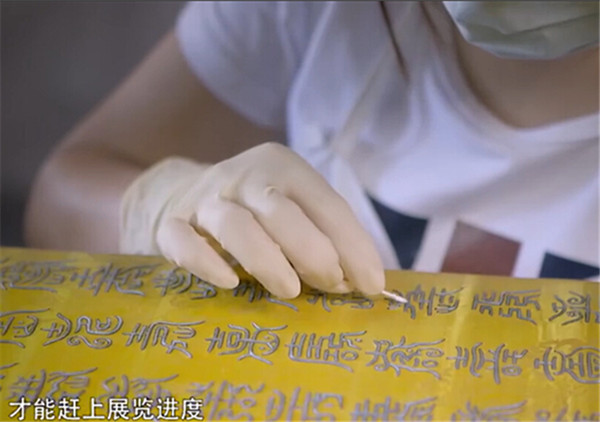 |
| A screenshot of the Documentary Master In Forbidden City |
A recently released Chinese documentary featuring the Forbidden City's cultural relics and their restorers' lives became a surprise hit, with more than 2.4 million watching it on iQIYI, a major video-streaming website in China.
Called Master In Forbidden City, the documentary shines light on the unsung life stories of restorers of cultural relics working inside the Forbidden City, together with the history of the antiques and the palace, the procedures of restoration and the development of cultural protection. The three-part documentary aired on CCTV (Central China Television) has notched up impressive rating of 9.5/10 on Douban.com, one of the biggest film and TV review websites in the country.
Compared with movies and TV shows, a documentary focused on history and culture rarely becomes so much popular. So what’s the secret behind its huge success?
Human touch
Even though the stories take place in the historical Forbidden City and the cultural relics are a key element of it, the documentary does not dwell on the past. Instead, the camera focuses on the ordinary individual human beings -- the restorers, and their life in Beijing, which creates a bond between the audience and the restorers and bridges the gap between the narrator and the viewer.
Instead of using panorama images and bird’s-eye views, the TV series closely follows the restorers and shows the relationship between people and relics, individuals and scenarios, people-to-people, in a natural setting. Instead of experts, what appears in the camera are real people with personalities, people who play guitars and make jokes about each other after a long day of restoration work. The documentary shows a deep respect to individuals and generates a strong sense of immersion.
Narrative pace
The stories are told in a slow and leisurely pace, closely capturing the restorers' working and living status. Restoration of cultural relics and antiques is time-consuming, and sometimes boring. Yet these restorers' patience and persistence and their tranquil lifestyle are especially precious in a society where everything is changing so fast. The camera captures their devotion to work and their attitude to life.
"If you choose this job, you would have to endure hours of work sitting on the chair. You need to be quiet and get used to being quiet," said Wang Jin, ancient clock repair expert, says in the documentary. This exact sense of tranquility and persistence is visible throughout the series.
Craftsmanship spirit
What is more touching in the documentary is the craftsmanship spirit embodied in these restorers. Years of humdrum work requires not only skill, but also faith and spirit. The pursuit of preciseness and perfection, devoting to work, strong patience, endurance to loneliness...all these qualities are a vivid interpretation of "craftsman spirit". This lifts and broadens the theme of the documentary.
Master In Forbidden City delicately tells the stories of both modern individuals and historical cultural relics, in a touching yet natural way. No doubt people loved it so much.
 |
 The evolution of J-10 fighter
The evolution of J-10 fighter Top 10 Asian beauties in 2016
Top 10 Asian beauties in 2016 Train rides through blossoms
Train rides through blossoms When female soldiers meet flowers
When female soldiers meet flowers North Sea Fleet conducts drill in West Pacific Ocean
North Sea Fleet conducts drill in West Pacific Ocean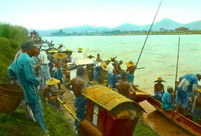 Old photos record the change of Sichuan over a century
Old photos record the change of Sichuan over a century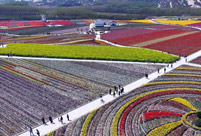 Breathtaking aerial photos of tulip blossoms in C China
Breathtaking aerial photos of tulip blossoms in C China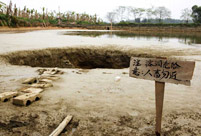 Horrific: Pit swallows 25 tons of fish overnight
Horrific: Pit swallows 25 tons of fish overnight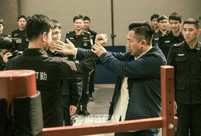 Police officers learn Wing Chun in E. China
Police officers learn Wing Chun in E. China Top 20 hottest women in the world in 2014
Top 20 hottest women in the world in 2014 Top 10 hardest languages to learn
Top 10 hardest languages to learn 10 Chinese female stars with most beautiful faces
10 Chinese female stars with most beautiful faces China’s Top 10 Unique Bridges, Highways and Roads
China’s Top 10 Unique Bridges, Highways and Roads Govt vows reform despite failure of tomb-removal campaign
Govt vows reform despite failure of tomb-removal campaign New Yorker writer’s Chinese food poem sparks racism ruckus
New Yorker writer’s Chinese food poem sparks racism ruckus Too much skin in Tibet Nude photos taken near sacred lake spark outcry
Too much skin in Tibet Nude photos taken near sacred lake spark outcry China strives to solidify authority over reincarnation of Tibetan Living Buddhas
China strives to solidify authority over reincarnation of Tibetan Living BuddhasDay|Week